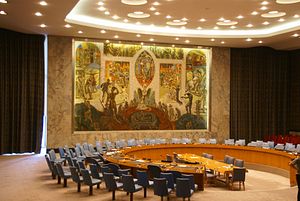Last week, coincidentally on International Human Rights Day, the UN Security Council (UNSC) discussed the human rights situation in North Korea. Such a discussion, only the second of its kind, was put forward by the U.S. after it added “human rights abuses in North Korea” to the permanent UNSC agenda and follows on from the UN Commission of Inquiry report into rights violations within the country which Michael Kirby, the Chair of the report described as ”human rights abuses on a scale without parallel in the contemporary world,’ comparable to the atrocities of Nazi Germany.”
Last week’s discussions focused on political prison camps, serious food insecurity, and gender-based violence and discrimination, including against women who are returned to the DPRK after having fled the country. Any public discussion on DPRK’s record is highly significant, with Pyongyang traditionally being extremely sensitive to commentary on its widely known abuses, including the alleged internment of up to 120,000 of its own citizens, using state sovereignty as a way to sidestep answering any questions.
The focus on North Korea’s human rights record within the UN has been led by the U.S. and is a change of tactics in pressuring Kim Jong-un. By moving rights abuses as a permanent item on the Security Council agenda, the U.S. aims to further pressure North Korea into change, or at least further morally discredit the Kim dynasty in the eyes of the world. While serious rights violations have been known for some time, North Korea has often threatened to leave any negotiations on its ballistic missiles program if the issue is raised.
While the UN predictably did not adopt an official outcome during the proceedings last week, by placing rights on the agenda, it is forcing the issue of human rights in the DPRK to the forefront of international political consciousness. It also highlights the Kim dynasty’s own failures, both economically and politically. The very fact that so many political prisoners are kept confined shows the desperation of the regime in stabilizing its own power, something which goes against its heavily promoted image of complete unity to the Kim dynasty.
It must also be noted that China and Russia – both highly sensitive to their own human rights records – called for a vote on whether the debate should go ahead at all, which they lost. Chile, France, Jordan, Lithuania, Malaysia, New Zealand, Spain, the U.K. and the U.S. all voted in favor, with Angola, China, Russia, and Venezuela against. Chad and Nigeria abstained. Although China tried to stop the meeting, and is against the concept of debating human rights at the Security Council, not all who voted against disagreed with the view that North Korea has committed violations. Angola voted against on China’s assertion that this was not an issue for the UNSC, rather than outright criticizing the notion of North Korean abuses.
None of this will lead to any major changes within the DPRK nor will it lead to closer co-operation with Seoul, which is seeking expand the number and scope of the inter-Korean family reunions. It will, however, continue to highlight and damage North Korea on the international stage. The call from UN High Commissioner for Human Rights Zeid Ra’ad Al Hussein to refer North Korea to the International Criminal Court will further erode Kim Jong-un’s image globally. It is interesting to note the speculation arising from the abrupt cancellation of North Korean pop band Moranbong’s Beijing concert, with the final decision to go home allegedly made after a concert staff member cited Kim Jong-un’s referral to the International Criminal Court for human rights abuses.
The politics of human rights abuses in North Korea will continue to be a sore spot for the Kim regime and will continue to embarrass. Expect to see more such hearings in the coming years, with the aim of building more global momentum and condemnation of North Korea’s abuses. By continually highlighting the extreme violations and morally degrading North Korea, the U.S. aims to make it harder for globally expansionist Chinese leaders to continue to associate with such a regime. With China eager to improve its global image, it may in years to come be increasingly reluctant to be seen to be close to Kim Jong-un. Next year, South Korea will become chair of the UN Human Rights Panel, which leaves Seoul in an interesting position. It could choose to focus heavily on North Korea’s abuses, in doing so potentially harming reunification efforts. However, with DPRK violations now permanently on the UNSC agenda, it may see accountability for North Korean actions as an added condition for any reunification plans.
Jack Hands is a former political advisor, having worked in the U.K. and European parliaments. He has written for several major political blogs, notably Conservative Home. Currently based in Korea, he is a former founder of North Korea Campaign UK, which campaigned for awareness of the plight of political prisoners inside North Korea. Follow him on Twitter @jackhands1.
































